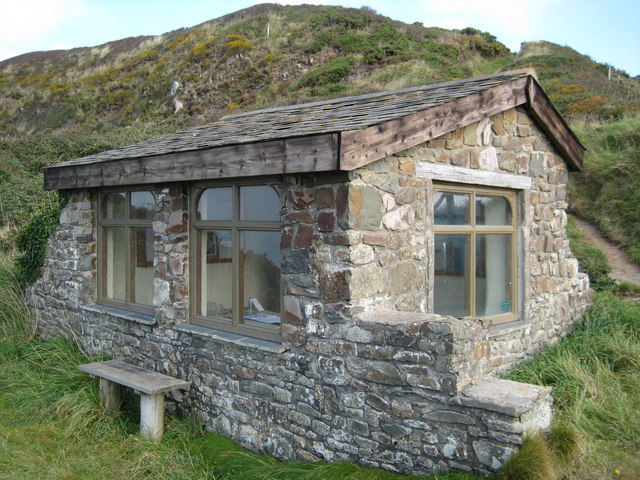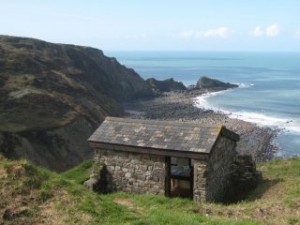 |
| Ronald Duncan's Hut Hut overlooking the coast on the Devon/Cornwall border, built by Poet and playwright, Ronald Duncan. 
In Ronald Duncan’s Writing Hut
By Roman Krznaric | Published: 31 July 2014
I am sitting in a tiny, sparse stone hut at the top of a North Devon cliff, overlooking the sea. Outside is an enticing sign: ‘Ronald Duncan’s Writing Hut is Open’. This is where the West Country poet and playwright – best known for writing the libretto for Benjamin Britten’s opera The Rape of Lucretia – used to spend his working days.
Just down the steep coastal path is his former home, West Mill, now belonging to his daughter, the sculptor Briony Lawson, and her photographer husband Andrew Lawson. I’m currently staying at the house, which is nestled in the isolated Marsland Valley, probably the most beautiful and inspiring landscape I’ve ever encountered. At night, sleeping with the windows wide open, I can hear both a running stream and the waves crashing into the rocks in the bay. On my first day at the mill I found a shelf-full of Ronald Duncan’s writings, and began reading his lyrical, outspoken and completely captivating book All Men Are Islands, the first volume of his autobiographical trilogy.
Duncan, who was born in 1914 and died in 1982, is not as well known as he once was. But in his autobiography I discovered an extraordinary literary life. He was friends not just with Benjamin Britten, but with poets and writers like T.S. Eliot, Ezra Pound and Gerald Brennan, who had lived at West Mill before the First World War (along with Lytton Strachey and Dora Carrington). As a young man Duncan had an adventurous streak, and after leaving Cambridge, where he had studied English Literature under F.R. Leavis, he spent a month working in a coal mine, then lived on an ashram with Gandhi. Quite unusual for a budding aesthete who was descended from wealthy Austro-German aristocrats.
During the Second World War he was a conscientious objector, and together with his wife Rose Marie conducted an experiment in utopian living influenced by Gandhi, running his farm as a commune. Unfortunately several of the poets and pacifists who joined them were more interested in writing verse and squabbling with each other than milking cows, and the experiment faded into failure. Despite this, it was emblematic of Duncan’s attempts to live by his political and ethical principles. Not that he was of a saintly nature. He was well aware of his contradictory and often narcissistic character, openly admitting that for much of his life, ‘I was obsessed with myself, and in love with myself’.
I was immediately struck by the opening lines of his autobiography, written in his late forties, which signal a unique and free-thinking literary voice:
‘We settle down to write our life when we no longer know how to live it. To pause is to admit defeat. When the present is interesting we do not bother with the past. We try to remember only when we’ve lost the vitality of doing anything worth remembering. The past is a wastepaper basket. We burrow into it only when we feel we have no future.’
Duncan certainly made the present interesting. His venture down the coal mine had echoes of George Orwell’s empathy experiment living as a tramp on the streets of East London in the early 1930s. Like Orwell, Duncan pawned his clothes and got himself a second-hand coat and slouch cap. He then trudged across the slag heaps near Chesterfield in search of work. Being mistaken for a gypsy due to his dark complexion, and claiming he had worked with horses in a circus, he landed a job looking after 35 pit ponies at the bottom of the shaft. His descriptions of work at the coal face have a poetic precision that rivals Orwell’s essay ‘Down the Mine’:
‘The face itself was only three feet high. Men lay on their sides, stripped to the waist, hacking the wall with a pick-axe. Their mates, kneeling beside them, loaded the stint on to the conveyor-belt, which, like an endless crocodile, clawed its way through the workings. I was terrified: each stroke of the pick-axe brought down part of the wall. It looked like energetic suicide, a desperate effort to bury oneself alive. But these matchstick pit-props held the roof of slate and, as soon as the coal was cleared, the miner placed another prop in position and rammed a wedge home with a sledge-hammer. All this time they were oblivious of the dangers, and spoke only of the relative merit of football players.’
Later he said that nobody had the right to use coal who had not worked down the mine themselves.
My favourite passage in All Men Are Islands is buried in the middle of the book, where he tries to spell out his underlying philosophy of life and give a sense of how he felt different, even detached, from other people. In doing so, he offers one of the most evocative descriptions I have ever read of what it can mean to seize the day:
‘What people said was important seemed trivial to me. Things I thought fundamental were not subjects they cared to discuss. All men are islands: there seemed to be no bridge for me.
Basically the difference lay in this: I was, and am, acutely aware that life is ephemeral, limited and brief. I never wake up in the morning without being surprised at being alive: I never go to sleep without wondering whether I shall wake up. Death to me was the reality. Yet everybody I met and saw seemed unaware of it. They seemed to live as if they would live for ever. How else could they spend forty years marking exercise-books, going to an office to earn the money which would enable them to go on going to an office to earn the money which would enable them to – . I could see a skull beneath every bowler hat. Perhaps I should have been an undertaker. But I must make this point if no other: I was obsessed with the feeling that I was a small boat floating on an ocean, and the ocean was death. Nobody I knew would admit this sea that supported and surrounded them. This made communication difficult: the language was the same, but I could not share their values. I envied their insulation. I was jealous of their indifference. But I could not emulate them, however much I tried.’
As I sit here in Duncan’s cliff-top writing hut, the wind and rain swirling around me, I can only hope that his message stays with me and that I have the courage to sail on that same boat on that same ocean.
Suddenly there’s a knock at the hut door. A woman in sensible walking gear peers inside and sees me sitting at the old desk with my fingers poised on my laptop, staring out across the Atlantic. She looks me up and down and asks, hesitantly, ‘Are you Ronald Duncan?’
(http://www.romankrznaric.com/outrospection/2014/07/31/2440) 
In the third part of his autobiography, Obsessed, Duncan describes how he came to acquire his refuge:
‘During the war, the Admiralty had asked my permission to erect a small look-out hut on the cliff edge above West Mill. It overlooked the approach to the Bristol channel. On a still summer evening in 1940 I had stood on that spot to watch eight ships in convoy blow up and sink within fifteen minutes. The hut the Admiralty erected was made of galvanised iron on a concrete base and measured ten by six feet.
After the war the Admiralty offered to take the hut away or let me have it as a gift. Since it was rusting and unsightly, I asked them to remove it. This they did.
A few years later, I found myself repeatedly going up the cliff path to sit for hours on this site. The view attracted me because it contained no signs of humanity: the open Atlantic, the bracken and gorse covered cliffs, giant boulders on the beach beneath. The only signs of life were the buzzards and a single unmated falcon. I was drawn to this view which had not changed since the Cambrian era.’
Obsessed by Ronald Duncan (p.105). Published by Michael Joseph, 1977.
Fuente: (http://www.literaryplaces.co.uk/?p=860)

For Duncan the location obviously acted as an inspiration, and it crops up in his writing again and again. His long, five-part poem, Man, is far more abstract than his previous work – it opens with the origin of the solar system and explores the creation of life and the evolution of humanity – but his love of the place still shines through:
Then I sat down by that shore, the abyss above me
The unfathomable all about me. And I stared out at the sea
Realising: that I could not see the waves
Nor any part of the ocean
Independent of the process of observation;
that Laws of Nature were laws of thought,
And even Reason needs reason as method,
As the will, the will, before it can reason.
Then I peered out at the horizon
Where I myself sailed by oblivious to my signal,
And I stood up and shouted hysterically
Into the abyss before me, above me, and about me:
‘Order is what I seek.
From the chaos of my mind,
Order is what I will impose upon you.’
And the indifferent waves broke on the deserted shore
Echo alone answered. Then I wrapped that terror
which blew across the loom of space
closely about me like a scarf;
fear is not what I will fear,
it is indifference which frightens me.
Excerpt from ‘Canto Twelve, Kosmos’, from Man, Part One, by Ronald Duncan. Published by the Rebel Press, 1970.  |

Rehabilitar habilitar una esperanza posibilitar un lugar un encuentro habitar un espacio un tiempo abrir los ojos a media caña respirar oler cada mañana caminar por las nubes regar los cipreses coger un puñado de arena sembrar la tierra con el viento oler oler la vida quedarse inmóvil viendo pasar las nubes... MOLER LA VIDA.
El tema central de este Blog es LA FILOSOFÍA DE LA CABAÑA y/o EL REGRESO A LA NATURALEZA o sobre la construcción de un "paradiso perduto" y encontrar un lugar en él. La experiencia de la quietud silenciosa en la contemplación y la conexión entre el corazón y la tierra. La cabaña como objeto y método de pensamiento. Una cabaña para aprender a vivir de nuevo, y como ejemplo de que otras maneras de vivir son posibles sobre la tierra.


No hay comentarios:
Publicar un comentario